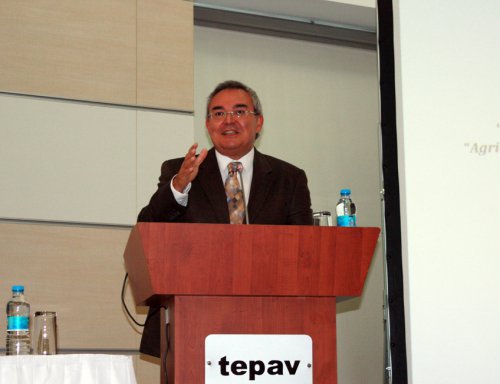TEPAV Director Sak: “It is the Right Time for Agricultural Policy Design to Achieve the 2023 Targets” TEPAV hosted the Conference titled "Agricultural Policy Development and the Multilateral Trading System", which gathered experts in the field and decision-makers.

ANKARA – TEPAV Director Güven Sak stated that problems in the food industry, which constitutes 10 percent of all manufacturing industry output in Turkey, can not be solved without addressing agricultural problems. He stressed that it was the right time for policy design in the agricultural sector, which is of critical importance for Turkey’s targets for 2023.
The conference by TEPAV, titled Agricultural Policy Development and the Multilateral Trading System, began on Monday, September 24 2012. Speaking during the opening of the conference, Sak said that despite the transformation from the rural to the urban areas with the urban population reaching 75 percent of the total population, Turkey had yet to come up with a new agricultural policy design. He said, “we don’t have a new strategy, but we can. There is a window of opportunity for policy design in agriculture. We have to make the best of this opportunity. Now is the time to ponder this.” Stating that TEPAV wanted to concentrate intensively on agriculture in the period ahead, he added, “because we believe that the chronic problems in the agricultural sector need to be solved in order to achieve the targets for 2023.”
Giving information about the recent work of TEPAV on agriculture, he stated that a project financed by the Research Foundation Eurasia Turkish Culture (ASAV) involving value chain analyses for eight sub-sectors in agriculture was ongoing, and that the project carried out for the Ministry of Customs and Trade on the efficiency measurement of sunflower sales cooperatives recently had been completed. Sak said, “We are about to complete the project carried out together with the Konya Commodity Exchange and Mevlana Development Agency on the assessment of the potential impacts of the EU process on the competitiveness of Konya’s agriculture industry. And we have finalized the Licensed Warehousing and Warehouse Receipts System project financed by the European Bank for Reconstruction and Development.”
A new Institute with an American partner
Stressing that TEPAV wanted to systematize the capacity it had started to build in the field with an institute, he heralded the opening of the TEPAV Food and Agricultural Policies Research Institute (TEPAV |FAPRI). He stated that the institute, to be opened in collaboration with the Food and Agricultural Policies Research Institutes (FAPRI) at Iowa State University and Missouri University, both in the US, would train experts and work closely with the corporate sector, sector associations, and ministries.
Delivering an opening speech after Sak, Clay Hamilton, Agricultural Counselor at the US Embassy in Ankara, stated that such conferences had been successful for the development of the agriculture sector in the US and that they had promoted agricultural exports and imports via creating healthy dialogues between the actors of the sector. Maintaining that they tried to realize policies that would be to the benefit of the largest group possible, he added that they attached importance to the cooperation between the Turkish and the US governments in agriculture. Hamilton also expressed that they were happy about the new partnership between TEPAV and Missouri University involving the new institute.
The opening session was followed by a ceremony in which a letter of intent for the opening of the Institute was signed by Güven Sak, TEPAV Director, and William H. Meyers, representative of the Food and Agricultural Policies Research Institute (FAPRI, which is based at Iowa State University and Missouri University.
During the first session of the conference moderated by TEPAV Economic Policy Analyst Ozan Acar, John Finn of the World Trade Organization (WTO) Trade Policy Review Unit delivered a presentation that addressed how the Organization worked and how countries benefit from the multilateral trade system.
The first session in the afternoon themed, Turkey and the WTO: Policy Objectives and Key Stakeholders, was hosted Muharrem Dilbirliği, Representative of the Ministry of Food, Agriculture and Livestock and Former Agriculture Counselor to the WTO, and Sait Akman of TEPAV. During sequent afternoon sessions moderated by Akman, Karen Stuck, the United States Codex Office / US Department of Agriculture gave a presentation titled “The Importance of Science-Based Standards,” and Gregg Young, US Representative to the WTO, Geneva, made a presentation titled “Key Issues of Significance to Agriculture in the WTO.”
At the second day of the conference on Tuesday, 25 September 2012, a series of sessions were held. The keynote speakers and the themes of the sessions were:
Karen Stuck, United States Codex Office / US Department of Agriculture, “The US Inter-Agency Policy Development Process.”
Floyd Gaibler, United States Grains Council, “US Industry’s Role in US Agricultural Policy Development.”
William Meyers, University of Missouri, Food and Agricultural Policies Research Institute - FAPRI, “The Role of Academia in Policy Making: The Example of FAPRI.”
Wyatt Thompson, University of Missouri, Food and Agricultural Policies Research Institute, FAPRI, “Objective Policy Analysis: Examples from FAPRI.”














